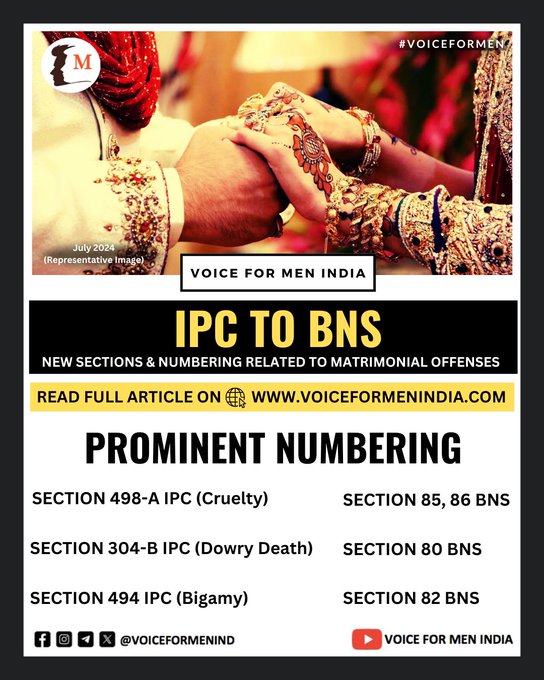For the understanding of the newly revised numbering from the Indian Penal Code (IPC) to Bharatiya Nyaya Sanhita (BNS), we are listing down all Sections related to matrimonial or marriage related offenses, as below:
Section 80 BNS: Dowry Death (Former Section 304B IPC)
(1) Where the death of a woman is caused by any burns or bodily injury or occurs otherwise than under normal circumstances within seven years of her marriage and it is shown that soon before her death she was subjected to cruelty or harassment by her husband or any relative of her husband for, or in connection with, any demand for dowry, such death shall be called “dowry death”, and such husband or relative shall be deemed to have caused her death. Explanation.—For the purposes of this sub-section, “dowry” shall have the same meaning as in section 2 of the Dowry Prohibition Act, 1961.
(2) Whoever commits dowry death shall be punished with imprisonment for a term which shall not be less than seven years but which may extend to imprisonment for life.
Section 81: Cohabitation caused by man deceitfully inducing belief of lawful marriage (Former Section 493 IPC)
Every man who by deceit causes any woman who is not lawfully married to him to believe that she is lawfully married to him and to cohabit or have sexual intercourse with him in that belief, shall be punished with imprisonment of either description for a term which may extend to ten years, and shall also be liable to fine.
Section 82: Bigamy (Marrying again during lifetime of husband or wife) (Former Section 494 IPC)
(1) Whoever, having a husband or wife living, marries in any case in which such marriage is void by reason of its taking place during the life of such husband or wife, shall be punished with imprisonment of either description for a term which may extend to seven years, and shall also be liable to fine.
Exception.—This sub-section does not extend to any person whose marriage with such husband or wife has been declared void by a Court of competent jurisdiction, nor to any person who contracts a marriage during the life of a former husband or wife, if such husband or wife, at the time of the subsequent marriage, shall have been continually absent from such person for the space of seven years, and shall not have been heard of by such person as being alive within that time provided the person contracting such subsequent marriage shall, before such marriage takes place, inform the person with whom such marriage is contracted of the real state of facts so far as the same are within his or her knowledge.
(2) Whoever commits the offence under sub-section (1) having concealed from the person with whom the subsequent marriage is contracted, the fact of the former marriage, shall be punished with imprisonment of either description for a term which may extend to ten years, and shall also be liable to fine.
Section 83: Marriage ceremony fraudulently gone through without lawful marriage (Former Section 496 IPC)
Whoever, dishonestly or with a fraudulent intention, goes through the ceremony of being married, knowing that he is not thereby lawfully married, shall be punished with imprisonment of either description for a term which may extend to seven years, and shall also be liable to fine.
Section 84: Enticing or taking away or detaining with criminal intent a married woman (Former Section 498 IPC)
Whoever takes or entices away any woman who is and whom he knows or has reason to believe to be the wife of any other man, with intent that she may have illicit intercourse with any person, or conceals or detains with that intent any such woman, shall be punished with imprisonment of either description for a term which may extend to two years, or with fine, or with both.
(This is not similar to Adultery, because if a married woman is willingly co-habiting with another man, other than husband, the paramour cannot be framed under this section)
Section 85: Husband or relative of husband of a woman subjecting her to cruelty (Former Section 498-A IPC)
Whoever, being the husband or the relative of the husband of a woman, subjects such woman to cruelty shall be punished with imprisonment for a term which may extend to three years and shall also be liable to fine.
Section 86: Cruelty Defined (Former Section 498-A IPC)
For the purposes of section 85, “cruelty” means—
(a) any wilful conduct which is of such a nature as is likely to drive the woman to commit suicide or to cause grave injury or danger to life, limb or health (whether mental or physical) of the woman; or
(b) harassment of the woman where such harassment is with a view to coercing her or any person related to her to meet any unlawful demand for any property or valuable security or is on account of failure by her or any person related to her to meet such demand.
Section 87: Kidnapping, abducting or inducing woman to compel her marriage, etc (Former Section 366 IPC)
Whoever kidnaps or abducts any woman with intent that she may be compelled, or knowing it to be likely that she will be compelled, to marry any person against her will, or in order that she may be forced or seduced to illicit intercourse, or knowing it to be likely that she will be forced or seduced to illicit intercourse, shall be punished with imprisonment of either description for a term which may extend to ten years, and shall also be liable to fine; and whoever, by means of criminal intimidation as defined in this Sanhita or of abuse of authority or any other method of compulsion, induces any woman to go from any place with intent that she may be, or knowing that it is likely that she will be, forced or seduced to illicit intercourse with another person shall also be punishable as aforesaid.
Section 88: Causing miscarriage (Former Section 312 IPC)
Whoever voluntarily causes a woman with child to miscarry, shall, if such miscarriage be not caused in good faith for the purpose of saving the life of the woman, be punished with imprisonment of either description for a term which may extend to three years, or with fine, or with both; and, if the woman be quick with child, shall be punished with imprisonment of either description for a term which may extend to seven years, and shall also be liable to fine. Explanation.—A woman who causes herself to miscarry, is within the meaning of this section.
Section 89: Causing miscarriage without woman’s consent (Former Section 316 IPC)
Whoever commits the offence under section 88 without the consent of the woman, whether the woman is quick with child or not, shall be punished with imprisonment for life, or with imprisonment of either description for a term which may extend to ten years, and shall also be liable to fine.
Section 90: Death caused by act done with intent to cause miscarriage (Former Section 314 IPC)
(1) Whoever, with intent to cause the miscarriage of a woman with child, does any act which causes the death of such woman, shall be punished with imprisonment of either description for a term which may extend to ten years, and shall also be liable to fine.
(2) Where the act referred to in sub-section (1) is done without the consent of the woman, shall be punishable either with imprisonment for life, or with the punishment specified in said sub-section. Explanation.—It is not essential to this offence that the offender should know that the act is likely to cause death.
Section 91: Act done with intent to prevent child being born alive or to cause to die after birth (Former Section 315 IPC)
Whoever before the birth of any child does any act with the intention of thereby preventing that child from being born alive or causing it to die after its birth, and does by such act prevent that child from being born alive, or causes it to die after its birth, shall, if such act be not caused in good faith for the purpose of saving the life of the mother, be punished with imprisonment of either description for a term which may extend to ten years, or with fine, or with both.
Section 92: Causing death of quick unborn child by act amounting to culpable homicide (Former Section 316 IPC)
Whoever does any act under such circumstances, that if he thereby caused death he would be guilty of culpable homicide, and does by such act cause the death of a quick unborn child, shall be punished with imprisonment of either description for a term which may extend to ten years, and shall also be liable to fine.
Illustration. A, knowing that he is likely to cause the death of a pregnant woman, does an act which, if it caused the death of the woman, would amount to culpable homicide. The woman is injured, but does not die; but the death of an unborn quick child with which she is pregnant is thereby caused. A is guilty of the offence defined in this section.
Offences Against Child (related to marriage)
Section 93: Exposure and abandonment of child under twelve years of age, by parent or person having care of it (Former Section 317 IPC)
Whoever being the father or mother of a child under the age of twelve years, or having the care of such child, shall expose or leave such child in any place with the intention of wholly abandoning such child, shall be punished with imprisonment of either description for a term which may extend to seven years, or with fine, or with both.
Explanation.—This section is not intended to prevent the trial of the offender for murder or culpable homicide, as the case may be, if the child die in consequence of the exposure.
Section 94: Concealment of birth by secret disposal of dead body (Former Section 318 IPC)
Whoever, by secretly burying or otherwise disposing of the dead body of a child whether such child die before or after or during its birth, intentionally conceals or endeavours to conceal the birth of such child, shall be punished with imprisonment of either description for a term which may extend to two years, or with fine, or with both.
Voice For Men India Note:
- Overall the provisions remain the same with a different numbering
- In 2024 too, it is only a woman presumed to be the victim in a matrimonial violence
- Since this is BNS (former IPC), it is applicable on every Indian man, irrespective of his religion
DO WATCH:
Supreme Court Requests Parliament To Amend Section 498-A In Bharatiya Nyaya Sanhita | Misuse of 498A
(In May 2024, Supreme Court clearly remarked that Section 498-A IPC was a copy paste job in the new BNS, despite its gross misuse. The top court had requested the Government of India to make amends before the new BNS comes into force, however, the same has not been complied with. Thus, the criminal law introduced in 1983, will continue in its original form for next several decades.)
LEAVE YOUR COMMENTS BELOW:
IPC To BNS: New Sections & Numbering For Matrimonial Or Marriage Related Offenses
▪️Overall provisions same
▪️In 2024 too, it is only a woman presumed to be victim in a matrimonial violence
▪️BNS is applicable irrespective of religion#VoiceForMenhttps://t.co/tiNHN1k6wh— Voice For Men India (@voiceformenind) July 8, 2024
Join our Facebook Group or follow us on social media by clicking on the icons below
If you find value in our work, you may choose to donate to Voice For Men Foundation via Milaap OR via UPI: voiceformenindia@hdfcbank (80G tax exemption applicable)
































